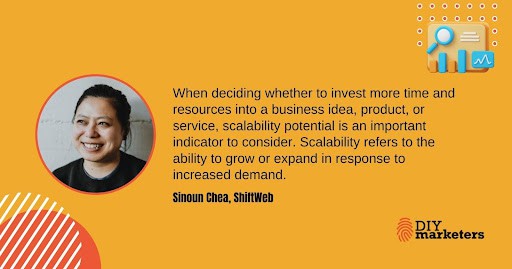17 Ways to Know if You Should Pursue or Let Go of Your Business Idea

Table of Contents
If you’re not sure whether to pursue or let go of your business idea, don’t worry – you’re not alone. In fact, most entrepreneurs face this same dilemma at some point during their journey.
One way to increase your odds of having a solid business idea is to do an opportunity analysis. But let’s say you’ve done that and now you have to decide whether to double down or let it go.
To help you best determine when to double down on a business idea or move on, we asked entrepreneurs, startup founders and business leaders this question for their best insights.
“What is one indicator to look for when determining whether to double down on a business idea, product, or service or move on?”
Here are 17 indicators these leaders look for to determine whether to double down on a business idea or move on:
Do You Have the Right People in Place?
Although there are several ways to gauge whether a business idea is worth doubling down on, one of the best determiners of success is if you have the right people in place to grow your brand.
Thought leadership is an effective indicator if a business can grow organically as recent studies have demonstrated that over 80% of entrepreneurs felt that available thought leadership content was ineffective and indicative of a weak model.
Therefore, if you have the talented and insightful minds who can produce thought-provoking content around your idea, you will have a greater chance of creating a dialogue before hitting the market, as well as get a read on how impactful your proposed product or service will be in your industry.
In assessing your thought leadership potential, you can determine your ability to organically grow your business and decide whether to double down on your concept.
Greg Gillman, MuteSix
What Does the Data Say?
Testing is crucial to determine the best business ideas. Try out a business strategy and then observe the outcome. If applicable, you could perform A/B testing between two business strategies. Then you can double down on the strategy with the most positive results.
Without the willingness to experiment and examine your analytics, you will have no data points to help you decide what business ideas you should double down on from a logical standpoint.
Nick Shackelford, Structured Agency
Is There a Product-Market Fit?
When you’re thinking about doubling down on a business idea, product, or service, one of the best indicators to look for is product-market fit.
Product-market fit is when a product is solving a problem that people actually have within a market that you can access.
If you’ve found product-market fit, you’ll often see a very low churn rate in your customers and a very high conversion rate in your sales funnel.
When you don’t have product-market fit, it’s very hard to grow your business because you’re always either acquiring customers who don’t want to buy from you or you have to spend a lot of money on marketing to attract the customers that might want to buy from you.
If you’ve found product-market fit, you will often see that your customers are doing a lot of the marketing for you through word of mouth and referrals, which can be a very powerful growth driver for your business.
Matthew Ramirez, Paraphrase Tool
Can You Adjust and Change to Meet a Need?
Business conditions change and sometimes our vision of what we thought our venture would be and the reality may differ, which means your willingness to be flexible should be considered in whether you should double down.
It is common at the beginning to create an ideal picture in our minds of our products and how they will be viewed by the public, yet very few ideas go exactly as planned, and it is at that point that we must make a decision of whether we wish to continue.
Your willingness to be flexible on items such as product design, marketing, branding, target audiences and even company culture, is a necessity as it will be most likely that your original vision on one, if not all of these will be challenged.
Those who are unwilling to accept reality and make necessary changes will often find their business failing. Therefore, make sure you take into account your ability to be flexible as it is an important indicator to be considered when deciding whether to double down.
Matt Miller, Embroker
Have You Lost Your Passion?
If you feel yourself missing the thrill of early days, your business may be best left in someone else’s hands. Plenty of leaders are “serial entrepreneurs” who love to build a business to scale into sustainable growth continually.
When the business is excellent, but you’re more interested in starting something new than doubling down, consider selling or exiting your current project and moving on to a new, exciting business venture.
John Li, Fig Loans
Do You Have Enough Customers?
The best way to validate your idea is by conducting surveys. Ask questions directly from the people who you are planning to help: your target customers.
You can do this for Free using Google Forums. Make sure you ask the right and open-ended questions to get the most out of your survey.
You can ask questions like; what’s your biggest challenge with X, would you like a solution for X, how much you’re willing to pay for that solution, and do you know other people who are going through the same problem as you, etc. Conduct these surveys on platforms like Facebook, Twitter, LinkedIn, Reddit, or wherever your target audience hangs out. Later, analyze the data: if the answers are convincing enough to start working on your idea, go for it.
Lachlan de Crespigny, Revelo
Find a Real Need
When you are determining whether to double down on a business idea or move on, the determining factor should be “Is there a need for this service or product?”.
If there is a need, this creates an automatic audience and customer base. It’s best to double down on business ideas and products that provide a solution for a customer so that you can continuously provide that satisfaction and create trust with your clients.
From there, it is easy to continue growing and establishing yourself as an expert in the field.
Gregg Dean, Layla Sleep
Do You Have a Competitive Advantage?
One of the biggest indicators you should be looking for to help with your technical analysis is the competition. By understanding what already exists in the market, you’ll be able to understand if there’s a needed market gap for your product/service or idea and whether the investment is necessary or not.
If you find the competition already offers exactly what you were planning on doing, you can also use this research to see what edge you can have over the competition and test out how your audience will react to it to see if it’s worth doubling down or moving on altogether.
Tim White, milepro
Are You Making Excuses for Poor Results?
This is a painful one, but unfortunately you need to move on from a business idea if you find yourself making excuses for negative outcomes.
While entrepreneurs need to be able to overcome obstacles and learn from negative experiences, they also are able to be brutally honest about a negative experience and apply it to their next move.
If you are at a point where negative outcomes are met with denial or justification, it is time to move on. Negative outcomes without a possibility for growth means you are tied to the dream and not to the reality of how your idea is performing despite multiple tries. Your energy is better spent finding your next big idea.
Gates Little, altLINE Sobanco
Is There Space to Grow?
Market and competition research are essential indicators of whether you should go ‘all in’ on your product or service.
For example, if you’re looking to offer a product but you learn the market is oversaturated with brands new and old, you have to decide if your unique selling proposition can survive the noise.
It’s possible to be successful in a saturated market, but it is more difficult. If you’re still in the brainstorming phase of what to offer, it’s wise to weigh all options.
Breanne Millette, BISOULOVELY
Is There Potential for Repeat Purchases?
Good marketing can muddy the waters a bit because, if you get enough eyeballs on something then a few people will buy. But, if the product isn’t what they need or want, they won’t make that mistake twice. A good indicator of whether a product has potential is the percentage of people that stick around.
For example, if you have a life-saving medicine, it probably doesn’t matter how much it costs. People will buy as much of it as they need to stay alive. Likewise, if you have a product or service that really hits home, people will continue to buy it or continue to use it as often as necessary.
One thing to note is that in more mature markets, the bar to get people to stick around is much higher. For example, an email marketing service would need a lot of bells and whistles to entice customers to the platform. A novel technology like extended reality would have a much easier time keeping customers.
Daniel Ndukwu, UsefulPDF
Is it Repeatable?
A good indicator to look for when determining whether to double down on a business idea, product, or service is whether you can duplicate or replicate the success of what you are trying to do.
If it’s possible to build something from scratch that replicates your current strategy, then by all means pursue this route. However, if it’s not possible or prohibitively expensive to do so (due to licensing rights and intellectual property considerations), then moving on may be the best decision.
Keep in mind that even if duplicating your previous results isn’t possible or practical, continuing with an unsuccessful venture may still result in negative consequences such as wasted time and money, loss of credibility and trust among potential customers/ clients/ partners, and diminished morale amongst team members.
Johannes Larsson, JohannesLarsson.com
Will it Scale?
When deciding whether to invest more time and resources into a business idea, product, or service, scalability potential is an important indicator to consider.
Scalability refers to the ability to grow or expand in response to increased demand. If a business is not scalable, it will reach a point where it cannot continue to grow without making significant changes to its structure or operations.
This can limit its long-term potential and make it more difficult to achieve profitability. On the other hand, a business with good scalability potential will be able to adapt and grow as demand increases. This makes it a more attractive investment and gives it a better chance of success in the long run.
Sinoun Chea, ShiftWeb

Are People Searching For It?
Look for related terms being searched. A great indicator to determine if you’re onto a good business idea, service, or product is to research the related terms people are searching for online – that way you can tell if your topic is “of interest” to the greater public (or not).
For example, if you want to make an energy drink that would be the first-ever fully organic product of its kind, then you can use Moz (an online resource that looks up monthly search volumes) and type in a related term such as “all-natural energy.”
Depending on how many searches it has garnered will tell you if there is a demand from consumers for your product. Looking up related terms that are heavily searched is a great indicator of whether or not you’re onto an idea that will fulfill a need and resonate with consumers.
Jimmy Minhas, GerdLi
Do Enough People Want It?
The market must have a want or need for your product ideations.
If there are alternatives and solutions which already exist, you must evaluate whether your product makes a compelling enough argument for customers to switch over.
This is a crucial aspect of successful market penetration. With numerous options available, diffusion and adoption of your product will solely depend on your ability to compete, and your willingness to innovate on price and promotion.
Above all else, make research a priority. By understanding how prospective customers feel about your concept, you can make the necessary changes and inclusions to facilitate strong market demand.
There could be features that an existing solution is missing, or pain points that you can solve for. If you see demand, positive sentiment, and potential for improvement, you have every reason to double down on a business idea.
Andrew Gonzales, BusinessLoans.com
How Long You Can Commit to the Idea?
After you’ve done the necessary research, you’ve enough data to validate that there’s a target market, and it’s sizable — the next thing is very personal to you. Is your business, product, or service idea something you’re most passionate about?
Can you spend your next decade of life perfecting, managing, building, and growing it? Is this something you’re most crazy about? Because, if you don’t have that fire burning in you, whether your idea is business-worthy or not — does not really matter. If it’s something you don’t genuinely care about, you’ll have a hard time committing thousands of hours consistently and scaling it to a noticeable level.
Kyle Basett, Altitude Control
What Do Your Customers Think?
The best thing you can do when running your business is listen to your customers.
What are your customers saying about your product or service? Do they enjoy the experience that you are offering? If feedback is positive, that is a sign to double down your efforts on this business idea, product, or service.
If feedback is negative, it means it is time to pivot your strategy and possibly abandon it entirely. Listen to your customers and let them drive your decisions moving forward.
This has helped us grow our business over the years and can help you grow yours. In conclusion, listen to your customers and decide what you should double down on or move on from entirely.
Marshall Weber, Stor-It
Conclusion
As you can tell from all of these responses, only you can decide whether to double down on your idea or let it go. After all, it’s your idea and you have to be the one to live with the decision. However, by doing your research, staying Passionate, listening to feedback, and knowing when to pivot — you increase your chances of success exponentially.







